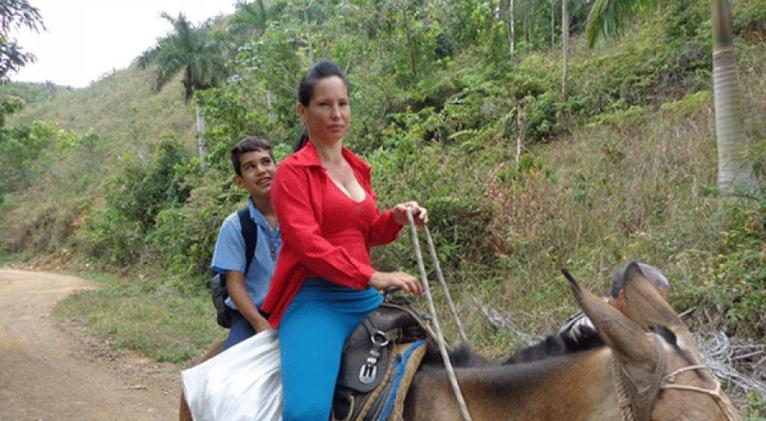IN PICTURES: Expedition to the center of Machuca
especiales

The lush hills of Machuca are so beautiful that at times it was worthwhile to look away from the rocky road to watch that amazing landscape of Cuban geography.
Reality in this mountainous area of San Cristóbal, in the western province of Artemisa, far exceeded the stories previously told.
Right at the foot of the road, when we were about to climb or descend the mountains-at times one or the other– we met a peasant from the area who made us doubt about the wisdom of that expedition to the center of Machuca.
"Are you sure you want to enter, they’re three hours on foot through difficult routes?" said the man barely without knowing ourselves, when he
wiped the sweat with his hands and arranged the sack of taters he was carrying on his shoulders.
Olga Lidia, a native from Santa Cruz de los Pinos, a town in San Cristóbal, who was accompanying us in the effort to reach the intricate place, looked at us with some discouragement, but did not let herself be overcome by the words of that stranger.
Firstly mud, land, then big and small stones, and of all sizes, prevented us from moving quickly to save time. They were more than three hours and 15 kilometers in a single direction.
Fatigued and tired, we looked anxiously for the so-called "two-storey house", because when we arrived at this spot we were supposedly already halfway there.
We found it unpainted, with a custard apple tree just in front of the façade, as well as sour green and ripe oranges all around.
Then a small house, another, another, and pineapple plantations everywhere, even on the slopes of the mountains.
The silence of that place, truly amazing, succumbed to a thunderous music that came from a solitary house, which made us realize that there was electric current.
About to cross a stream, we asked a local couple of peasants for some water. He, at the "command" of a yoke of oxen, preferred to speak very little. She, kind like all country people, rather than quenching our thirst, encouraged us to continue the journey.
And finally the baseball field!, which we also had some reference from. We were already a few steps from Machuca, when we saw a
man who crossed the field diagonally, after seeing from afar new people in the home ground. We asked him about something, but he did not reply.
He was deaf-mute. He joined the road and we followed him, hoping to find the final destination at any time. Suddenly, the trail opened like a horizon and the first thing we saw was the flag, waving from one side to the other as if it were the queen of the place, then the teacher, children, women, and the few houses in the “batey” (settlement around a sugar mill). And we were unable to say a single word. Fatigue had overcome us.
After all, we did not need a big introduction. Then a neighbor appeared with a pineapple and a blender in her hands, then there came the snack, the coffee. And there was no lunch, because nobody expected us anymore.
The “batey” is located on a plain, adorned with mountains, and there is only the little school, a bakery, a doctor's office, and a television room, which is not in use because there’s no signal reception.
The teacher lives in the school. He arrived there 19 years ago, then –from a nearby town– he brought his wife and the children came over the years. “I will never go from here because of the children”, he said excitedly, notwithstanding, many relatives encourage him to leave Machuca.
Two hours later, the return was risky, on a huge truck, with unpredictable and anguished vagaries. It was transporting some workers of the Bread Enterprise, who were repairing and painting the bakery that day since the morning. By chance, it was the "vehicle" that had entered minutes before we reached the starting spot of the road to Machuca.
Among so many fears I was certain that "it would have been preferable to go back on foot". While Olga Lidia did not stop watching me, not to see what was happening on both sides of the landscape. The danger of falling down those cliffs was real.
In the so-called "bed" of the truck, sitting on a stool at the mercy of the wind and the cold of the cloudy afternoon, I tried to think about the chronicle I should write. Then many scenes came to my mind, the waving flag, the smile of the children playing with a ball and a wheelbarrow commonly called “chivichana”, the cordiality of the people of Machuca and, especially, that sweetness of the teacher who does not think to leave that inhospitable and lonely place, of pretty difficult access, thanks to that big heart that makes him think about other people.















Translated by Jorge Mesa Benjamin / Cubasi Translation Staff













Add new comment